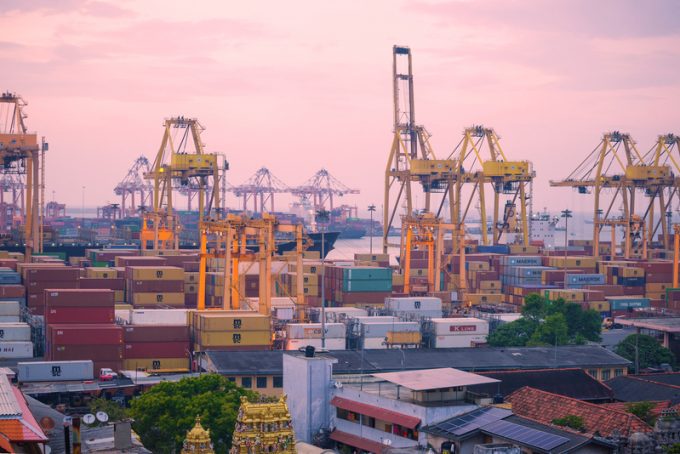'Game-changer' may now be 'game-over', as India eyes cabotage u-turn
India’s government is under pressure to re-regulate its coastal shipping policies following major declines for ...
GM: RAISING THE ROOF GGM: IN FULL THROTTLE GZIM: MAERSK BOOST KNIN: READ-ACROSSMAERSK: NOT ENOUGHMAERSK: GUIDANCE UPGRADEZIM: ROLLERCOASTERCAT: HEAVY DUTYMAERSK: CATCHING UP PG: DESTOCKING PATTERNSPG: HEALTH CHECKWTC: THE FALLGXO: DEFENSIVE FWRD: RALLYING ON TAKEOVER TALKODFL: STEADY YIELDVW: NEW MODEL NEEDEDWTC: TAKING PROFIT
GM: RAISING THE ROOF GGM: IN FULL THROTTLE GZIM: MAERSK BOOST KNIN: READ-ACROSSMAERSK: NOT ENOUGHMAERSK: GUIDANCE UPGRADEZIM: ROLLERCOASTERCAT: HEAVY DUTYMAERSK: CATCHING UP PG: DESTOCKING PATTERNSPG: HEALTH CHECKWTC: THE FALLGXO: DEFENSIVE FWRD: RALLYING ON TAKEOVER TALKODFL: STEADY YIELDVW: NEW MODEL NEEDEDWTC: TAKING PROFIT

Sri Lanka Port Authority (SLPA), which governs terminals in Colombo Port, claims there is no real threat from other subcontinent ports trying to poach mainline carriers, amid large-scale economic setbacks plaguing the island nation.
Carriers regularly serving Colombo, mainly loading Indian transhipment cargo, have faced increased turnaround and productivity concerns in recent weeks, in the aftermath of fuel shortages that had pulled trucks off the port.
“The recent expansions in the major ports around Sri Lanka have made the country ready to accommodate the amplified volumes, which connect Far East to Europe/US cargo along with Indian Subcontinent cargo,” an SLPA spokesperson told The Loadstar.
“Considering that Port of Colombo (POC) was named as the 13th-connected port in the world, it affirms how efficient our service is.”
The official noted that, despite the prevailing “unfavourable” scenario, Colombo had seen volumes grow in a gradual trajectory in Q1 2022.
“POC has shown a growth of 5.7% (combined), while SLPA and CICT terminals have shown growth of 10.4% and 7.3%, respectively.”
Colombo comprises three container terminals: Jaya Container Terminal (JCT), operated by SLPA; South Asian gateway terminal (SAGT), majority owned by John Keells Holdings; and Colombo International Container Terminal (CICT), run by China Merchants Holdings.
Colombo’s Q1 throughput hit 1.85m teu, up from 1.75m teu, year on year, said the spokesperson.
SLPA officials shrugged off queries that vessels calling on Colombo had been hit by major congestion or delays.
“As per our records, arrival of vessels at Colombo port is as usual, owing to the uninterrupted service we offer, regardless of the circumstances in the country,” officials said. “Inter-terminal port operations are running smoothly and efficiently.”
SLPA also noted that the flow of feeder services from India into Colombo continued to be on schedule. However, the authority said the foreign exchange crisis had crimped the pace of import container clearance from the port, but “this situation is improving”, it added.
Colombo is one of the busiest hub gateways in South Asia. With the Sri Lankan crisis unlikely to fade any time soon, Indian port leaders spot a more “realistic” opportunity to bid on transhipment cargo moving in and out of the region by wooing mainline operators seemingly frustrated with Colombo woes. The ports of Cochin, Tuticorin and Chennai are leading those efforts.
“For transhipment of cargo over the southern Indian ports instead of Colombo, Tuticorn is unlikely to be an option, due to the limitation on the size of the vessels it can take,” Sunil Vaswani, executive director of the Container Shipping Lines Association, told The Loadstar.
“Chennai or Ennore could possibly be the options, but the issue of deviation would need to be considered, particularly since the mainliners are already struggling to keep to their schedules. Vallarpadam [at Cochin] could be another option, although all these options are still work-in-progress.”
Looking ahead, New Delhi has other high-stakes strategic plans to tame Colombo’s dominance of transhipment, although Indian ports are considered vastly uncompetitive vis-a-vis Colombo, or other regional hubs, in terms of tariff levels.
Adani Group development of a transhipment terminal at Vizhinjam, a green-field, deepwater site about 10 miles south-west of Trivandrum in Kerala state, is directed towards that goal. While behind schedule, it is due to open in early 2023.
You can contact the writer at [email protected].
Comment on this article